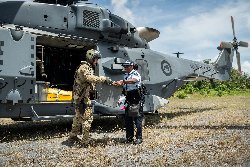UNSC Open Debate on Working Methods
Permanent Mission of New Zealand to the United Nations
United Nations Security Council Open Debate on Working Methods: Implementation of the note by the President of the Security Council (S/2010/507)
Statement as delivered by Gerard van Bohemen, Permanent Representative of New Zealand to the United Nations, July 19, 2016
________________________________________
Thank you Mr. President.
New Zealand welcomes today’s Open Debate.
As Matthew Rycroft has just said, Security Council working methods matter because poor working methods can lead to poor outcomes.
Progress has been made in recent years in codifying existing Council practice in documents such as Note 507, which we review today. This is welcome, as is the new Presidential Note on transitional arrangements for incoming members.
But let’s be honest. These Notes do not normally result in better Council performance.
Today, I address a few areas where New Zealand has sought to improve Council culture and practice during our term and where we think further work is required.
First, the quality of Council interactions
The Council was intended to be a collective security body. Too often it is a forum for polarising initiatives and last minute take-it-or-leave-it drafts tabled by so-called penholders.
These practices leave no space for meaningful input from Council colleagues, let alone affected parties.
New Zealand has made it a priority to try to create space for more meaningful discussions focused on identifying collective approaches and solutions.
During our Presidency last July we initiated an Ambassador-level breakfast to start the month. The aim was to have Permanent Representatives talk to each other about the challenges facing the Council and how they might be resolved.
We are pleased that the breakfast is now becoming established Council practice. We Permanent Representatives have good conversations about how to manage the programme of work and topics of the moment. But we believe we could do more if we were able and willing to engage in discussions of a more substantive, problem-solving nature.
Secondly, living up to our own undertakings
Paragraph 44 of Note 507 is clear that all draft resolutions should be introduced in Informal Consultations. This almost never happens. Penholders routinely take zero drafts straight to meetings of so-called “experts”.
This precludes any real effort at building genuine consensus on the key policy questions to be considered. Non-penholders have to choose between accepting a text largely as presented or risk being accused of torpedoing important documents if they wish to make substantive policy proposals.
These practices are neither effective, nor sustainable, nor respectful of the perspectives of other Council members.
Thirdly, more meaningful engagement with key stakeholders
Despite the provisions in paragraph 33 of Note 507, we are yet to see troop and police contributing countries consistently engaged in Council discussions. These countries need regular meaningful engagement on issues of importance to their contingents. For a variety of reasons, the formal consultations held a few days before a resolution is adopted rarely produce useful conversations.
Last year, New Zealand instituted the practice of informal “triangular consultations” between Council members, contributing countries, and the Secretariat to discuss key issues and challenges facing a number of UN peacekeeping missions. We think it is important that this practice is now fully mainstreamed and becomes part of standard Council practice.
Mr. President, time constraints do not permit consideration of other areas where we consider Council working methods can be improved. But I want to make some more general observations.
First, Elected Members have to take responsibility for the way the Council operates. It is easy to blame permanence and the veto for the Council’s dysfunction. But the acquiescence of the Elected 10 is also a big factor. 10 votes are needed to pass any resolution; procedural resolutions cannot be vetoed. If the 10 are prepared to assert themselves, the 5 cannot dictate terms – especially on working methods which are quintessentially a procedural matter.
Secondly, Council practice in the operation of subsidiary bodies is a glaring case where Council habits well-exceed the requirements of the Charter. Consensus is laudable if it strengthens the Council’s voice. But to elevate consensus to the equivalent of a 15 member veto is foolish, particularly if it allows a single member to assert control over matters that the Charter never envisaged as subject to veto.
If we really want to make this Council work more effectively – and New Zealand passionately believes that we must - the elected 10 must use their influence and their legitimacy as the representatives of the wider UN membership to push for real change. Notes on working methods can be useful. More important, however, is the courage to change behaviour, to do things differently and to exercise the powers conferred on us under the Charter.
In our own small way, New Zealand has tried to make a difference. We hope those that follow will continue our efforts.
Thank you.


 Save The Children: Rate Of Attacks On Healthcare in Gaza Higher Than In Any Other Conflict Since 2018
Save The Children: Rate Of Attacks On Healthcare in Gaza Higher Than In Any Other Conflict Since 2018 UN News: Green Light For New Cholera Vaccine, Ukraine Attacks Condemned, Action Against Racism
UN News: Green Light For New Cholera Vaccine, Ukraine Attacks Condemned, Action Against Racism Laureus: Grand Slam Champion Garbiñe Muguruza Announces Retirement Ahead Of Laureus World Sports Awards
Laureus: Grand Slam Champion Garbiñe Muguruza Announces Retirement Ahead Of Laureus World Sports Awards Carbon Market Watch: Going For Green - Is The Paris Olympics Winning The Race Against The Climate Clock?
Carbon Market Watch: Going For Green - Is The Paris Olympics Winning The Race Against The Climate Clock? New Zealand Defence Force: NZDF Working With Pacific Neighbours To Support Solomon Islands Election
New Zealand Defence Force: NZDF Working With Pacific Neighbours To Support Solomon Islands Election UN News: Ceasefire The Only Way To End Killing And Injuring Of Children In Gaza
UN News: Ceasefire The Only Way To End Killing And Injuring Of Children In Gaza